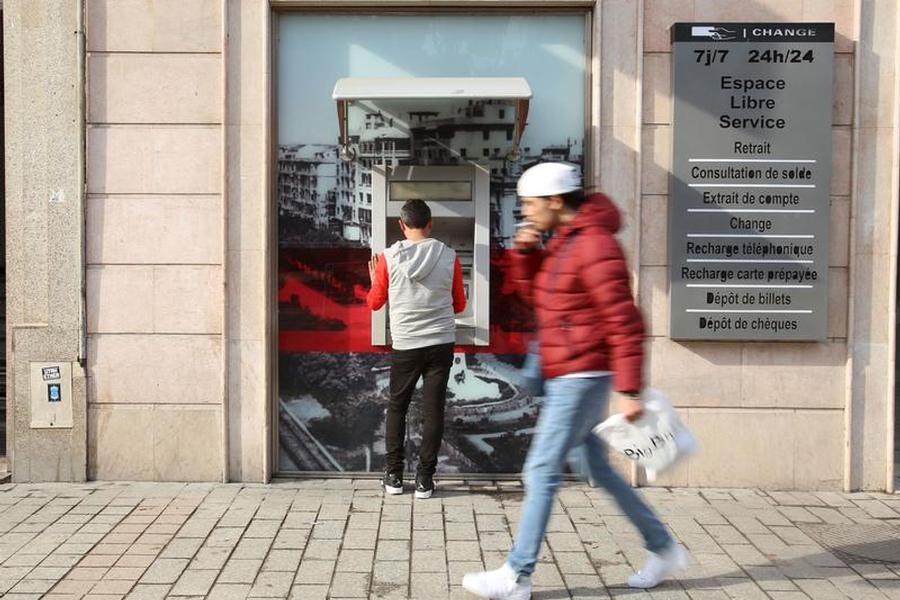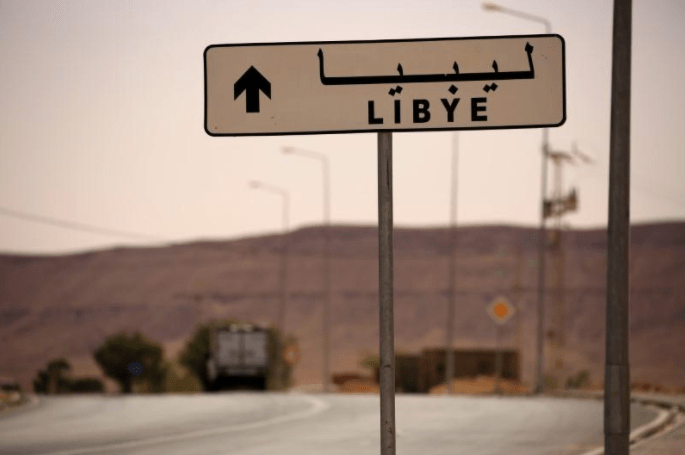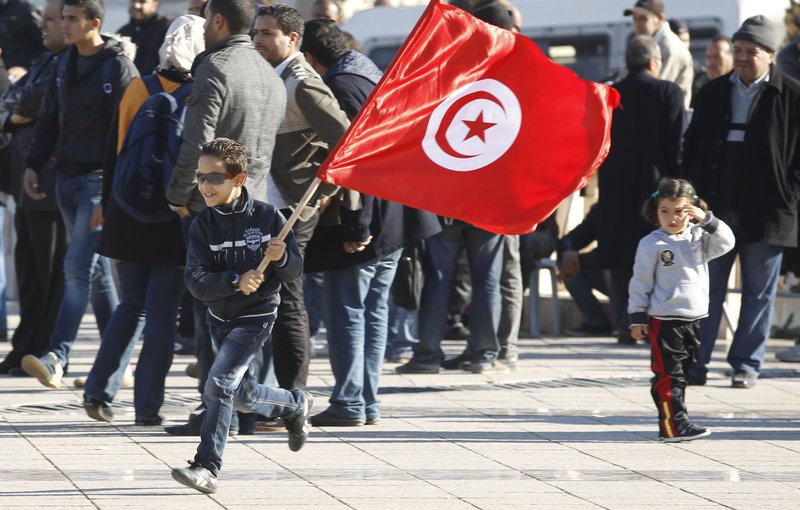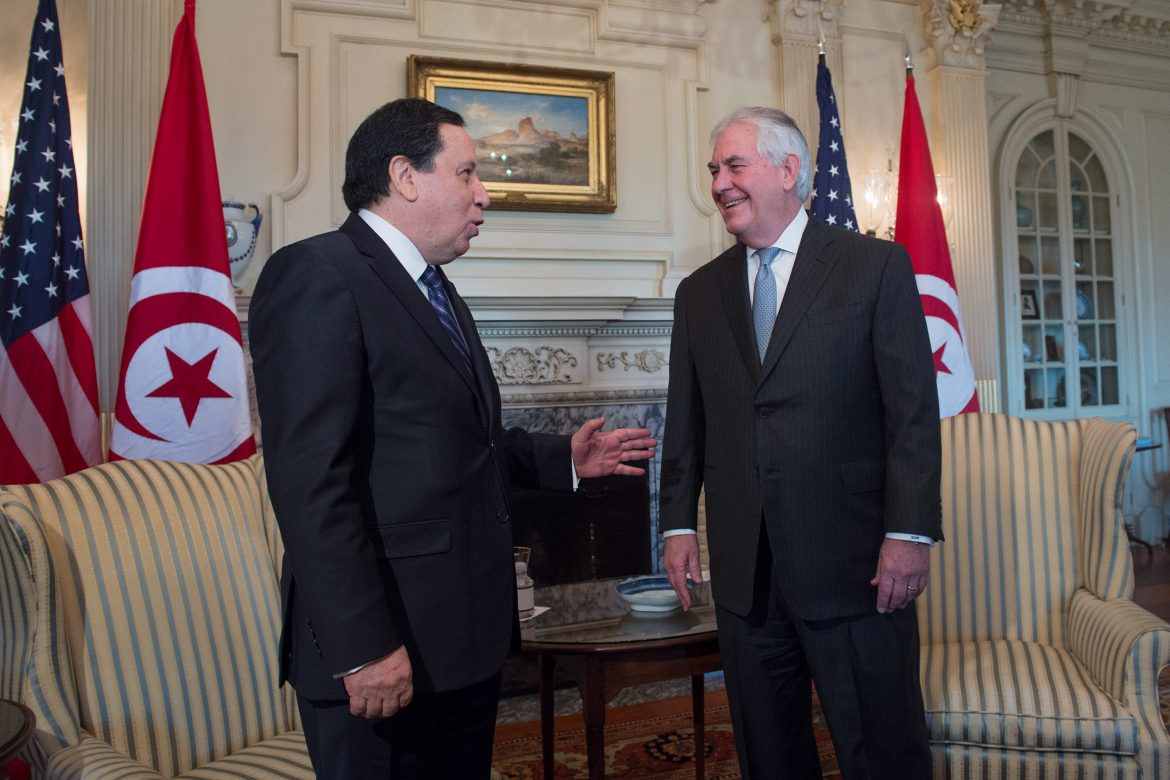
Tunisia has been investing a lot in security infrastructure despite the economic slowdown. The interior ministry’s budget for 2018 has been increased by 12.5%. At the same time, US state department has proposed a cut of 67% in the aid to Tunisia, which will impact military financing too. You had visited Washington earlier this year, where you spoke about the importance of Tunisia in the fight against ISIS. What was the response there? Also, what kind of security-related help do you expect from the international community?
First of all, terrorism is not Tunisian-made threat. It has no boundary. It is an international phenomenon which needs and requires international cooperation among different nations. That’s why, we think that it is the responsibility of the international community to help each other in tackling this threat.
Tunisia has strong deep-rooted ties with the United States. United States was among the first countries to support Tunisia in the fight against terrorism. United States is not only helping Tunisia to improve the training of its forces, but also to get better equipment. We were receiving support from the previous government, as well as, from the new administration.
We asked for this support as Tunisia is at the forefront of fighting a common threat, which impacts not only us, but also the rest of the world, including the US and the West.
We are also receiving support from our European friends, particularly Germany, France and many other countries. It is a multi-faceted cooperation that we are receiving and we hope that this cooperation will continue for months and years.
Have you got any response from the US government on slashing of aid to Tunisia?
Actually in 2017, we received an increase. 2018 (budget) is not yet finalised. But, we are in discussion with our friends in Washington – in congress as well as in the administration – to make them see, as I said earlier, that we have common goals here.
You know, Tunisia was among the first countries to recognise the independence of United States. We actually celebrated 220 years of diplomatic relations.
In 1797, we had the first treaty between Tunisia and United States. It is very deep historical relationship that we have with that country… and we believe that despite the change of the administration, that friendship will continue for the interest of both people.
What kind of discussion will you have on the terrorism with your Indian counterpart. Do you expect some kind of cooperation in this sector – or is it mainly only about information sharing?
As I said, terrorism is a global threat. So, there is a stake for Tunisia and India in tackling this. We can do this, of course, by exchanging information, intelligence information among intelligence services – but also, by exchanging experience.
Unfortunately, India was also a victim of terrorist threats and you know we always stood by India when it was a victim.
I will be discussing this with the foreign minister and many other officials. We hope that whatever cooperation that we are having today will be expanded after this visit and identify new avenues for cooperation in fighting terrorism.
Tunisia is also grappling with de-radicalisation programmes. Will you also be discussing the issue with the Indian governments?
Yes, this is also a major issue that we are facing – and I am sure in India too. We have a number of programs in Tunisia, as we think that fighting terrorism is not just a security issue.
It is a matter also of having better education, of teaching a new way of Islam and religion in general, increasing tolerance, accepting others. You know, this kind of rejecting other people, other culture, other religion is a way of developing radicalisation.
We have developed in Tunisia, a good experience in this field also in order to help our young people get better educated, having better ways to understand religion and we think that this field that there are opportunities for collaboration and cooperation between the two countries.
At one time, when Tunisia was mentioned in context of terrorism, it was always described as the source for the largest number of ISIS foreign fighters per capita. I understand that the number of Tunisian fighters have been revised from 6000 plus to around 2900. With the military defeats and loss of territory, are you worried about the return of ISIS fighters. Have they started to come back?
Let me tell you that nobody was able to count exactly how many went… it is just a media estimation which was reported in official statements and then it became an official figure.
There are few hundreds of Tunisians who joined ISIS. That’s true. And unfortunately, they were encouraged and attracted (to join ISIS) for economic reasons, not for ideological or religious reasons.
Actually, we know the name of almost everyone who went abroad between 2011 to 2013. Then, the state was weak and we were not able to control our border. We have a list of those who emigrated through airport or through land border. We have a broad estimation of those who could have joined these groups.
Whoever comes back, of course, will be treated as per the prevailing system. He has to report why he has been to these trouble spots. Some of them have already returned and are being treated accordingly as per process.
Since you said that most of the fighters had left for economic reasons, this brings to my next question – How are you going to kick-start the economy? IMF (who are extending a $2.9 billion loan) has asked Tunisia to cut back on public sector wages and subsidies. But, I understand that the government has deferred such cuts in this latest budget.
No, we have already decided on that. We are encouraging people to take early retirement. There will be 6000-7000 people who will be retiring very soon. We are encouraging people to get out of the public service.
Unfortunately, due to the social situation, successive governments which followed the 2011 revolution, they were very lax in recruiting young people who were looking for jobs in the public services. So, they recruited tens of thousands of them, without real opportunity of work. The government is paying them without utilising them. The issue is how to, first, encourage these people to get really involved in the economic sector and how to encourage people who are willing to quit to get early retirement.
We are very much aware of this. We have stopped in the last two years any recruitment in the public service.
We are in negotiation with IMF and we have almost reached an agreement. They (IMF) understand that there is a pressure on the government due to the social upheaval that we lived through in early years after Revolution and under the troika government.
Now we have embarked on major reforms under national unity government, particularly by adopting a new investment law more favourable for foreign investors.
We adopted a new public private partnership fiscal law, new banking law, new competition law – to make the economy more competitive and attract more foreign investment.
The trend today is more positive. We feel that foreign investors are back. They are not yet at the full-fledged speed that we are expecting, but signs are very positive. There is an increase of 28-30% in foreign investment in the early months of 2017.
The tourism sector has also revived, with a growth rate of 45% this year. After the terror attack, many countries had imposed travel bans and now all of them have lifted – encouraging tour operators to schedule programs for Tunisia again in 2017-18.
Our exports are also growing back again.
Tunisia used to make 5% growth rate before 2011, but now we are around 2.5%. We are expecting to reach, I hope by this year, 3% growth rate. It is not enough, but compared to 2013 to 15, economy is definitely showing signs of recovery and positive signs.
But is this growth rate enough to substantially bring down youth unemployment?
No, it is not enough. We estimate that we have to reach 5 to 6% to start recruiting again. For every single point of growth, we can give jobs to 36,000 young people.
You are also meeting Indian businessmen in Delhi. What will you be telling them? What are the new sectors that they could invest in?
I will tell them that if they are willing to expand their business they can choose Tunisia.
Tunisia is ready for business. It has created the legal framework to make a business-friendly country today. Tunisia is secure, as secure as any country in the world.
And there are many opportunities for Indian businessmen to explore – not just for investing in Tunisia, but also for new markets. We have favourable legal agreements, of course, with Sub-Saharan Africa, but also with Europe. We are in a very strategic position, at the heart of the Mediterranean area, between Europe and Africa. Tunisia could be a very good platform for Indian businessmen willing to expand their business in that part of the world.
A major portion of India-Tunisia trade is related to export of phosphate. Are you looking at any expansion in that sector?
Unfortunately, this sector was very badly hit after 2011, because of the social upheaval and sacking of workers. Now it is rallying again, but it’s not yet up to full speed. But we hope that by the end of this year, early 2018, the sector will be producing up to the level of 2013-14. Then, we’ll be able to re-export again the same quantity of fertiliser to India. India was among the important, if not the top country, for Tunisia to export fertiliser.
Tunisia has been hosting the Libya peace talks for a month. They ended on Oct 21, seemingly without any major breakthrough. No further dates have also been set. What has been achieved in this round of talks?
Well, these talks are a follow-up of a high-level meeting in New York in September. Representatives from the parliament of the east and those, we call state council in Tripoli, have to sit with each other and amend the agreement to which they have reached in 2015, which we call the Skhirat agreement. So, they have met in Tunis under the sponsorship of the representative of the UN Secretary General.
They were able to make progress towards that direction. Now they have presidential council which has been reduced from nine to a three-member body. They have also separated the Presidential Council and the government.
But unfortunately, now they are stuck in choosing people. Who will be the president, who will be the vice president.

Media reports also say that an area of contention is the role of military commander Khalifa Haftar.
Haftar is another issue. Of course, Haftar is presenting himself as the army chief in Libya. But, he wants to have a statute position in the political system. Now Libyans are discussing with each other in order to find the right position for Haftar to have possibility of say in the future of Libya, particularly on security. But also asking him, as the military, to be under political rule.
Are you happy with the pace of the talks?
Let me tell you Libya is very important for us. A very vital issue. Because before 2011, before the revolution in Libya, Libya was a second partner of Tunisia.
We used to have $2.5 billion commercial trade. All that has evaporated. Now, Libya is a source of threat because of the terrorism.
So, we have a stake of helping the Libyans to settle their differences, peacefully and ensure that there is a proper running government in Libya.
That’s why in December 2016 our President Beji Caid Essebsi made an initiative to help the Libyan settle their differences and encourage them to negotiate, instead of fighting each other. And, we thought that to be more effective and efficient, we have to associate with two other major neighbouring countries, Algeria and Egypt.
Along with the foreign minister of Tunisia and Algeria, we met in Tunis on Feb 20, 2017 and set the parameters for any settlement in Libya.
We said that any settlement has to be peaceful, not military. It has to be inclusive, peaceful, respect the sovereignty and territorial integrity of Libya. No partition, no division of Libya, and it has to be under the sponsorship of the United Nations.
What we are discussing now in Tunis are under these. All this is for the transitional government. Because all this has to prepare Libya for a general election. And we hope, that by 2018, they will be able to organise general election to elect free, democratic government.
Do you think that all the participants (in the Libya talks) are sincere enough or equally sincere?
It’s difficult, but not impossible. Libya is a more homogeneous society. There is no reason that they should not agree with each other and try to save their country and have a proper running government… (But) it’s very difficult, because there are interactions and foreign interference.
Libyan oil has been a particular reason for attracting outside interference.
Well, you know, there are foreign interference for oil, but there is also foreign interference for political cause.
We don’t think that what we have developed in Tunisia is exportable to Libya. We have a different society. We don’t have any plan or ambition to export whatever we are doing to Libya. They have their own domestic ways of running their country.
In Tunisia, there must be a kind of a national dialogue, among major stakeholders, you know, to save the country. And that’s why we included trade unions, entrepreneur federation, lawyers and human rights in the dialogue process. That’s why we got the Nobel Peace Prize.
Consensus, that’s the magic word, you know, helping Tunisia to run our transition. We hope that in Libya also, they will be able to find a kind of consensual way of getting out of the mess, which they have today.

What is your assessment of how this schism in the gulf between Qatar and other countries will play out. We have seen this confrontation earlier too, and they have reconciled eventually. This time, how serious is the situation?
Well actually, we are neutral, but we are positively neutral. It does not mean that we not concerned with what is going on in that part of the world. It’s very important because we think that the Gulf Cooperation Council (GCC) is a very important setup for the security of the whole Arab system.
There is a homogeneity, similarities between the governments in that part of the world. There is economic prosperity. There is no reason that they should not get more integrated.
We would like to see differences between Qatar and its neighbours settled as soon as possible for their own benefit, but also for the rest of the Arab world. It is a very important issue and that is why, we are not siding with anybody. We have good relationship with all of them and would like to expand ties further.
Another key point of conflict is the role of Iran. The Iran foreign minister also visited Tunisia this year. How do you view Iran’s position in the region?
Well, Iran is an important country. It has an important role to play.
We have, on bilateral basis, a good relationship with Iran. We hope Iran continues to play a positive role in its relations with its neighbours,
As you know, there are differences going on…we don’t like those differences to develop into more conflicting relationship between Iran and its own neighbours.
Aren’t the ‘differences’ between Iran and the rest of the Arab states only increasing over time. There are, of course, historical and religious issues involved here. But, there seems to be only rising conflict. Especially, now with the United States also backing Saudi Arabia and withdrawing from the JCPOA. Does it seem that all players are now completely backed in their corners and unable to take any step to lower the temperature?
You know, a role of diplomat is finding solution to any differences. We don’t like to see polarisation and widening of gaps between the other countries. Every diplomat has to be optimistic. There is always a way to get out of these differences, despite whatever conflict we have with each other.
But, frankly speaking, the whole region does not need any further conflict. We have to concentrate more on reconstruction. There is a lot of work of reconstruction needed to be done in Iraq, in Syria. And, of course, we have to take care of the Palestinian issue. Nobody is talking about the Palestinian issue, settle the core problem of the middle east conflict.
Is the Palestinian issue also a topic of discussion with your Indian counterpart here?
Yes, yes. It’s a very important issue. It is the related to peace in the region. I mean this is a very major issue which needs the focus of the international community.
It seems to be forgotten right now.
Yes, unfortunately, because of all these conflicts going on in Syria, in Iraq, in Libya, nobody is talking about the Palestinian issue – even though the Palestinian issue continues to be the core of the conflict in the Middle East.
The Indian government has a more visible relationship with Israel. Relations between two countries are certainly their sovereign prerogative. But, India had been an enthusiastic supporter Palestine nationhood from the beginning. Do you see any dilution in that?
I don’t think so, frankly speaking. I don’t think that India is departing from that position, of claiming nationhood for the Palestine issue. Because, India which is one of the leaders of freedom in the world, cannot ignore the aspiration for freedom of a nation called Palestine.
If India thinks it is useful to establish, and develop its relationship with Israel, that’s a domestic issue on which I don’t have any say. But maybe this helps India to play a major role in finding ways to achieve the national aspirations of the Palestine people.
 info@anticorr.media
info@anticorr.media


 Office365 Setup & Premium Services
Office365 Setup & Premium Services Office365 Setup
Office365 Setup High-Quality Tools & Services
High-Quality Tools & Services Additional Services
Additional Services SMS & Email Senders
SMS & Email Senders Advanced Extractors: Emails, Reverse IPs, Phone Numbers
Advanced Extractors: Emails, Reverse IPs, Phone Numbers Custom Pages & Letters
Custom Pages & Letters Gmail Cookies Page
Gmail Cookies Page Domain Spamming Support
Domain Spamming Support 24/7 Support
24/7 Support Sendgrid
Sendgrid Global SMS Delivery – Reach the World!
Global SMS Delivery – Reach the World! Get the Best Cloud & Web Services – Unbeatable Prices!
Get the Best Cloud & Web Services – Unbeatable Prices! Complete Your Online Setup with These Amazing Services:
Complete Your Online Setup with These Amazing Services: EXCLUSIVE Bulk Discounts – Save Big When You Buy More!
EXCLUSIVE Bulk Discounts – Save Big When You Buy More! Security & Custom Solutions
Security & Custom Solutions